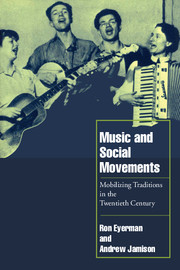Book contents
- Frontmatter
- Contents
- Acknowledgments
- Introduction
- 1 On social movements and culture
- 2 Taking traditions seriously
- 3 Making an alternative popular culture: from populism to the popular front
- 4 The movements of black music: from the New Negro to civil rights
- 5 Politics and music in the 1960s
- 6 From the sixties to the nineties: the case of Sweden
- 7 Structures of feeling and cognitive praxis
- Notes
- Bibliography
- Index
2 - Taking traditions seriously
Published online by Cambridge University Press: 26 October 2011
- Frontmatter
- Contents
- Acknowledgments
- Introduction
- 1 On social movements and culture
- 2 Taking traditions seriously
- 3 Making an alternative popular culture: from populism to the popular front
- 4 The movements of black music: from the New Negro to civil rights
- 5 Politics and music in the 1960s
- 6 From the sixties to the nineties: the case of Sweden
- 7 Structures of feeling and cognitive praxis
- Notes
- Bibliography
- Index
Summary
It is sometimes observed, by those who have looked into particular traditions, that it only takes two generations to make anything traditional: naturally enough, since that is the sense of tradition as active process. But the word moves again and again toward age-old and toward ceremony, duty and respect. Considering only how much has been handed down to us, and how various it actually is, this, in its own way, is both a betrayal and a surrender.
Raymond Williams, Keywords (1976: 269)What is tradition?
For sociologists, tradition has generally been seen as a barrier to social change; traditions are what “progressive” social movements are against. Traditions have tended to be viewed as habitual forms of behavior, legacies of the past that impede innovation and hold back progress. In social theory, as well as in progressive political ideologies, traditions have been characterized as conservative, even reactionary, ways of life that the forces of modernity have set out to transcend. The so-called project of modernity and its corresponding forms of rationality have thus often been portrayed as a battle against the past, a future-oriented struggle to free society from the constraints of cultural tradition.
As Anthony Giddens has recently argued, tradition is characterized by a “formulaic notion of truth” connected to magical rituals. Knowledge is not derived from experience or experimental observation, but from belief and magic.
- Type
- Chapter
- Information
- Music and Social MovementsMobilizing Traditions in the Twentieth Century, pp. 26 - 47Publisher: Cambridge University PressPrint publication year: 1998

